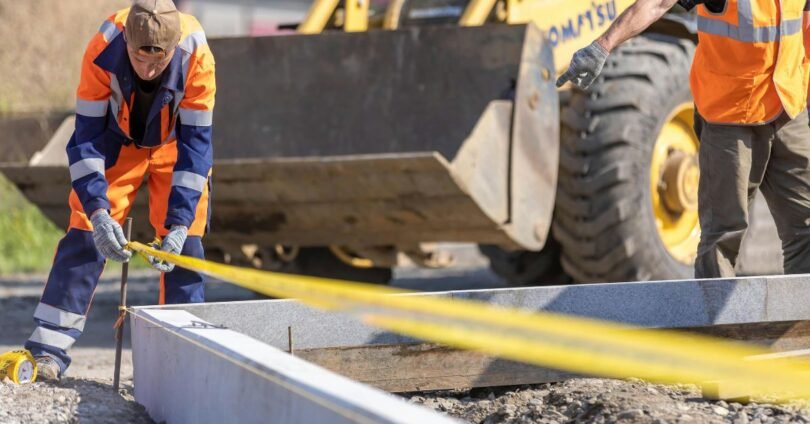$15,000 Construction Jobs in the UK with Visa Sponsorship
The United Kingdom’s construction industry is a cornerstone of its economy, driven by infrastructure projects, housing developments, and commercial expansions. With a persistent shortage of skilled labor, UK employers are increasingly turning to international workers, offering visa sponsorship to fill critical roles. For global job seekers, securing a construction job in the UK with visa sponsorship provides an opportunity to earn a competitive salary—starting at around £15,000 annually for entry-level roles—and build a rewarding career in a dynamic industry.
This comprehensive guide explores the top construction jobs in the UK offering visa sponsorship, detailing job roles, requirements, visa options, application strategies, and insights into the industry’s future. Whether you’re a skilled tradesperson or an aspiring construction worker, this article will equip you with the knowledge to navigate the UK job market and seize these opportunities.
Understanding the UK Construction Industry
The UK construction sector contributes significantly to the nation’s GDP, with an output of over £110 billion annually, according to industry reports. Major projects, such as HS2 (High Speed 2), Crossrail, and residential developments, fuel demand for skilled workers across various trades—“bricklayers, carpenters, electricians, and laborers.” Despite this demand, the industry faces a labor shortage, with an estimated 225,000 additional workers needed by 2027, as per the Construction Industry Training Board (CITB). This gap has prompted employers to recruit internationally, offering visa sponsorship to attract talent from around the world.
Construction jobs in the UK range from entry-level roles, such as general laborers, to highly skilled positions like site managers and engineers. Entry-level jobs often start at salaries around £15,000 per year, making them accessible to international workers seeking a foothold in the industry. Visa sponsorship, particularly through the Skilled Worker visa and Temporary Worker (T2) visa, enables foreign workers to join this thriving sector, with opportunities for career progression and long-term residency.
Top Construction Jobs Offering Visa Sponsorship
1. General Construction Laborer
General laborers are essential to construction sites, performing foundational tasks that keep projects on track. Companies like Balfour Beatty and Laing O’Rourke often sponsor visas for laborers to meet project demands, especially on large infrastructure developments.
Responsibilities:
- Assisting with site preparation, including clearing debris and setting up equipment.
- Loading and unloading materials, such as bricks, cement, and tools.
- Supporting skilled tradespeople, such as bricklayers or carpenters.
- Maintaining a clean and safe work environment in compliance with Health and Safety Executive (HSE) regulations.
Requirements:
- No formal qualifications required, though a high school diploma or equivalent is preferred.
- Physical fitness to handle manual labor and lift heavy objects (up to 25 kg).
- Basic English proficiency for safety instructions and team communication.
- Willingness to complete a Construction Skills Certification Scheme (CSCS) card, often employer-sponsored.
- Experience in construction or manual labor is a plus but not mandatory.
Salary Expectations:
Entry-level laborers earn approximately £15,000–£20,000 annually, with hourly rates of £8–£10. With experience or overtime, earnings can increase to £25,000 or more. Benefits may include paid training, health insurance, and accommodation support.
Visa Sponsorship:
The Temporary Worker (T2) visa is commonly used for seasonal or short-term laborer roles, while the Skilled Worker visa may apply for longer-term positions. Employers must hold a sponsor license and prove a shortage of UK workers.
2. Bricklayer
Bricklayers are in high demand due to the UK’s housing boom and infrastructure projects. Companies like Barratt Developments and Persimmon Homes frequently sponsor visas for skilled bricklayers to meet tight project deadlines.
Responsibilities:
- Laying bricks, blocks, and stones to construct walls, foundations, and structures.
- Mixing mortar and ensuring structural integrity.
- Reading blueprints and following architectural plans.
- Adhering to safety standards and site regulations.
Requirements:
- At least 1–2 years of documented bricklaying experience or a relevant qualification (e.g., NVQ Level 2 in Trowel Occupations).
- Proficiency in English for technical communication (IELTS 4.0 or equivalent).
- CSCS card (Blue Card for skilled workers) or eligibility to obtain one.
- Ability to work in various weather conditions and at heights.
Salary Expectations:
Bricklayers earn £25,000–£40,000 annually, with starting salaries around £15,000–£20,000 for apprentices or less experienced workers. Top earners in high-demand areas like London can make £50,000 with overtime.
Visa Sponsorship:
The Skilled Worker visa is the primary option, as bricklaying is listed on the UK’s Shortage Occupation List, easing sponsorship requirements. Employers cover visa fees (£610–£1,408) in most cases.
3. Carpenter
Carpenters are vital for constructing frameworks, fittings, and finishes in residential and commercial projects. Firms like Taylor Wimpey and Skanska often sponsor visas for carpenters, particularly for large-scale developments.
Responsibilities:
- Constructing and installing wooden structures, such as frameworks, roofs, and staircases.
- Cutting, shaping, and joining timber using hand and power tools.
- Interpreting technical drawings and specifications.
- Collaborating with other tradespeople to ensure project completion.
Requirements:
- NVQ Level 2 or 3 in Carpentry and Joinery, or equivalent international qualification.
- 1–3 years of carpentry experience, preferably with references.
- CSCS Blue Card or eligibility to obtain one.
- Basic English skills for workplace communication.
- Precision and attention to detail for high-quality finishes.
Salary Expectations:
Carpenters earn £20,000–£35,000 annually, with entry-level roles starting at £15,000–£18,000. Experienced carpenters in urban areas can earn up to £45,000 with overtime.
Visa Sponsorship:
The Skilled Worker visa is commonly used, with carpentry also on the Shortage Occupation List. Some employers may offer Temporary Worker (T2) visas for short-term projects.
4. Construction Plant Operator
Plant operators handle heavy machinery, such as excavators, bulldozers, and cranes, on construction sites. Companies like JCB and Costain sponsor visas for operators due to the specialized nature of these roles.
Responsibilities:
- Operating heavy machinery to excavate, lift, or move materials.
- Conducting routine maintenance and safety checks on equipment.
- Following site plans and supervisor instructions.
- Ensuring compliance with HSE regulations.
Requirements:
- Valid Construction Plant Competence Scheme (CPCS) card or equivalent international certification.
- 1–2 years of experience operating specific machinery.
- Basic English proficiency for safety and communication.
- Physical fitness and ability to work in challenging conditions.
Salary Expectations:
Plant operators earn £20,000–£35,000 annually, with entry-level roles starting at £15,000–£18,000. Experienced operators can earn £40,000 or more, especially on major projects.
Visa Sponsorship:
The Skilled Worker visa is typical, as plant operators are in short supply. Employers may also use Temporary Worker (T2) visas for seasonal roles.
5. Painter and Decorator
Painters and decorators enhance the aesthetic and protective qualities of buildings. Firms like Bellway Homes and smaller contractors often sponsor visas for skilled painters to meet project demands.
Responsibilities:
- Applying paint, wallpaper, and protective coatings to interior and exterior surfaces.
- Preparing surfaces through sanding, cleaning, and priming.
- Mixing paints to achieve desired colors and finishes.
- Maintaining tools and adhering to safety standards.
Requirements:
- NVQ Level 2 in Painting and Decorating or equivalent experience.
- 1–2 years of professional painting experience.
- CSCS card or eligibility to obtain one.
- Basic English skills for client and team interactions.
- Attention to detail and color coordination skills.
Salary Expectations:
Painters earn £15,000–£25,000 annually at entry level, with experienced professionals earning £30,000–£40,000 in high-demand regions.
Visa Sponsorship:
Skilled Worker visas are common, with some employers offering Temporary Worker (T2) visas for short-term projects, especially in busy construction seasons.
Visa Options for Construction Jobs
Securing a construction job with visa sponsorship requires understanding the UK’s visa framework. The following visa types are most relevant for construction workers:
Skilled Worker Visa
The Skilled Worker visa is the primary route for long-term employment in the UK, replacing the Tier 2 (General) visa. It is suitable for skilled roles like bricklayers, carpenters, and plant operators.
- Eligibility: A job offer from a UK employer with a sponsor license, a Certificate of Sponsorship (CoS), and a role on the UK’s eligible occupations list (e.g., bricklaying, carpentry).
- Requirements: Minimum salary of £25,600 or the “going rate” for the job (whichever is higher), though roles on the Shortage Occupation List may have lower thresholds (e.g., £20,480). English proficiency (IELTS 4.0 or equivalent) is required.
- Duration: Up to 5 years, renewable, with a path to permanent residency (Indefinite Leave to Remain) after 5 years.
- Process: Employers issue a CoS, and applicants apply online through the UK Visas and Immigration (UKVI) portal. Processing takes 3–8 weeks, with fees of £610–£1,408, often employer-covered.
- Advantages: Covers most skilled construction roles and offers a clear path to settlement.
Temporary Worker (T2) Visa
The Temporary Worker (T2) visa, part of the Global Business Mobility routes, is used for seasonal or short-term roles, such as laborers on specific projects.
- Eligibility: A job offer from a licensed sponsor for a temporary role, typically less than 12 months.
- Requirements: Basic English skills and a CoS. No minimum salary threshold, but wages must meet UK minimum wage (£11.44 per hour as of 2025).
- Duration: Up to 12 months, with limited renewal options.
- Process: Employers provide a CoS, and applicants apply via UKVI. Processing takes 3–6 weeks, with fees of £259.
- Limitations: No path to permanent residency, suitable for entry-level or seasonal roles.
Youth Mobility Scheme (YMS)
Available to nationals of certain countries (e.g., Australia, Canada, New Zealand) aged 18–30, the YMS allows work in any sector, including construction, without employer sponsorship.
- Eligibility: Citizenship from a participating country, age 18–30, and £2,530 in savings.
- Duration: 2 years, non-renewable.
- Process: Apply through UKVI with a fee of £298. Processing takes 3–6 weeks.
- Advantages: No job offer required, ideal for young workers seeking entry-level roles like laborers.
Challenges of Securing Visa-Sponsored Construction Jobs
While opportunities abound, international workers face challenges when pursuing visa-sponsored construction jobs:
- Employer Sponsorship: Not all employers have a sponsor license, limiting options. Large firms like Balfour Beatty and Skanska are more likely to sponsor than smaller contractors.
- Visa Costs and Delays: Processing times and fees (up to £1,408 for Skilled Worker visas) can be barriers, though employers often cover costs.
- Qualification Recognition: International qualifications may need verification through UK NARIC, adding time and cost (approximately £100–£200).
- Competition: High demand for visa-sponsored roles means applications must stand out with strong experience and certifications.
- Language Barriers: Basic English proficiency is mandatory, and some roles require higher levels for technical communication.
To overcome these, target employers with a history of sponsorship, such as those listed on the UKVI sponsor register, and ensure all documentation is complete and translated.
How to Find $15,000 Construction Jobs with Visa Sponsorship
1. Research Employers
Focus on companies known for sponsoring visas, including:
- Balfour Beatty: Sponsors Skilled Worker visas for roles like carpenters and plant operators.
- Laing O’Rourke: Offers sponsorship for laborers and skilled trades on major projects.
- Barratt Developments: Recruits bricklayers and carpenters with visa support.
- Costain: Sponsors plant operators and engineers for infrastructure projects.
- Skanska: Provides visa sponsorship for various construction roles.
Check company career pages or contact HR directly to confirm sponsorship availability.
2. Use Job Search Platforms
Leverage online job boards that filter for visa-sponsored roles:
- Indeed UK: Lists thousands of construction jobs, with filters for visa sponsorship.
- Reed.co.uk: Features 500+ construction roles, some with sponsorship.
- Totaljobs: Offers 300+ visa-sponsored construction jobs, particularly in London and the South East.
- LinkedIn: Ideal for networking and finding employers open to international hires.
Search for terms like “construction jobs with visa sponsorship” or “Skilled Worker visa construction” to find relevant listings.
3. Work with Recruitment Agencies
Agencies specializing in construction and international recruitment can connect you with visa-sponsored jobs:
- Hays Construction: Places workers in roles like bricklaying and laboring, with visa support.
- Randstad CPE: Offers visa-sponsored positions for skilled trades and laborers.
- Blue Arrow: Specializes in temporary construction roles with T2 visa sponsorship.
These agencies streamline applications and assist with visa paperwork, often at no cost to the applicant.
4. Network Strategically
Join industry groups like the CITB Network or LinkedIn groups for UK construction professionals. Attend virtual job fairs, such as those hosted by Jobsite, to connect with employers. Networking with current workers can lead to referrals and insider job leads.
5. Prepare a Strong Application
- CV/Resume: Highlight relevant experience, certifications (e.g., CSCS, CPCS), and qualifications. Use a UK-style CV, emphasizing measurable achievements (e.g., “Completed 10 residential projects as a bricklayer”).
- Cover Letter: Tailor it to each job, noting your eligibility for visa sponsorship and willingness to relocate.
- Documentation: Gather your qualifications, work experience references, driver’s license (if needed), and proof of English proficiency. Translate documents into English if required.
6. Obtain a CSCS Card
Most construction jobs require a CSCS card to prove competency and safety awareness. Employers may sponsor the card (£36 for the test, £21 for the card), but obtaining one in advance strengthens your application. Visit cscs.uk.com for details.
Steps to Apply for a Visa-Sponsored Construction Job
- Secure a Job Offer: Apply to companies offering visa sponsorship. Confirm sponsorship in the job listing or via HR.
- Gather Documents: Prepare qualifications, work experience records, CSCS/CPCS cards, passport, and proof of English proficiency (e.g., IELTS certificate).
- Employer Issues CoS: For Skilled Worker or T2 visas, the employer provides a Certificate of Sponsorship, detailing the job and salary.
- Apply for the Visa: Submit your application through the UKVI portal, including the CoS, documents, and fees. Attend a biometric appointment if required.
- Obtain Certifications: If not already held, complete CSCS or CPCS training, often employer-supported.
- Relocate and Start Work: Upon visa approval, relocate to the UK. Employers may provide onboarding support, such as accommodation or transport assistance.
Salary and Benefits for Visa-Sponsored Construction Workers
Salaries for entry-level construction jobs start at £15,000 annually, with potential for growth:
- General Laborers: £15,000–£20,000, up to £25,000 with overtime.
- Bricklayers: £15,000–£20,000 (entry-level), £25,000–£50,000 with experience.
- Carpenters: £15,000–£18,000 (entry-level), £20,000–£45,000 with experience.
- Plant Operators: £15,000–£18,000 (entry-level), £20,000–£40,000 with experience.
- Painters and Decorators: £15,000–£25,000, up to £40,000 in high-demand areas.
Benefits often include:
- Health insurance and pension schemes.
- Paid training for CSCS/CPCS certifications.
- Overtime pay (1.5x–2x regular rate).
- Accommodation or relocation assistance for international workers.
- Annual leave (typically 20–28 days).
Top Industries and Locations for Construction Jobs
Industries
- Residential Construction: Companies like Barratt Developments and Persimmon Homes drive demand for bricklayers, carpenters, and laborers.
- Infrastructure: HS2, Crossrail, and road projects employ plant operators and laborers (e.g., Balfour Beatty, Costain).
- Commercial Construction: Firms like Skanska hire for office and retail developments.
- Civil Engineering: Projects like bridges and tunnels require skilled trades (e.g., Laing O’Rourke).
Locations
- London: High demand for all trades, with 30% higher salaries than the national average.
- South East (e.g., Oxford, Reading): Booming residential and infrastructure projects.
- Midlands (e.g., Birmingham): HS2 and commercial developments fuel job growth.
- North West (e.g., Manchester): Urban regeneration projects need laborers and tradespeople.
- Scotland (e.g., Glasgow): Infrastructure and housing projects offer opportunities.
Tips for Success as an International Construction Worker
- Obtain Certifications Early: Secure a CSCS or CPCS card before applying to stand out. Employers may reimburse costs.
- Improve English Skills: Enroll in English courses to meet visa requirements (IELTS 4.0 or higher). Free resources are available through platforms like FutureLearn.
- Save for Initial Costs: Have £2,000–£5,000 for relocation, visa fees, and living expenses, as some benefits are paid post-arrival.
- Verify Employers: Check the UKVI sponsor register to ensure employers are legitimate and licensed to sponsor visas.
- Join Trade Unions: Organizations like UCATT provide support, job leads, and advocacy for construction workers.
- Stay Updated on Regulations: Monitor UKVI updates for visa changes, as policies may evolve (e.g., post-Brexit adjustments).
Future Outlook for Construction Jobs
The UK construction industry is set for robust growth, with £650 billion in planned infrastructure investment by 2030, according to the National Infrastructure Commission. The CITB forecasts a need for 225,000 additional workers by 2027, with roles like bricklaying and carpentry remaining on the Shortage Occupation List. Visa sponsorship programs are expected to expand, particularly for Skilled Worker visas, as the UK seeks to address labor shortages post-Brexit. Salaries are projected to rise by 3–5% annually, with experienced workers potentially earning £50,000 or more in high-demand regions.
Conclusion
Construction jobs in the UK with visa sponsorship offer a gateway to a stable and rewarding career for international workers. Starting at £15,000 annually, roles like general laborers, bricklayers, carpenters, plant operators, and painters provide diverse opportunities to suit various skill levels.
By targeting reputable employers, leveraging job boards and recruitment agencies, and preparing a strong application, foreign workers can secure these roles and build a future in the UK. With the right certifications, English proficiency, and persistence, you can take advantage of the UK’s booming construction industry and achieve your career goals.
For the latest job openings, visit platforms like Indeed, Reed.co.uk, or company career pages. Start your journey today and contribute to shaping the UK’s infrastructure and skyline.







